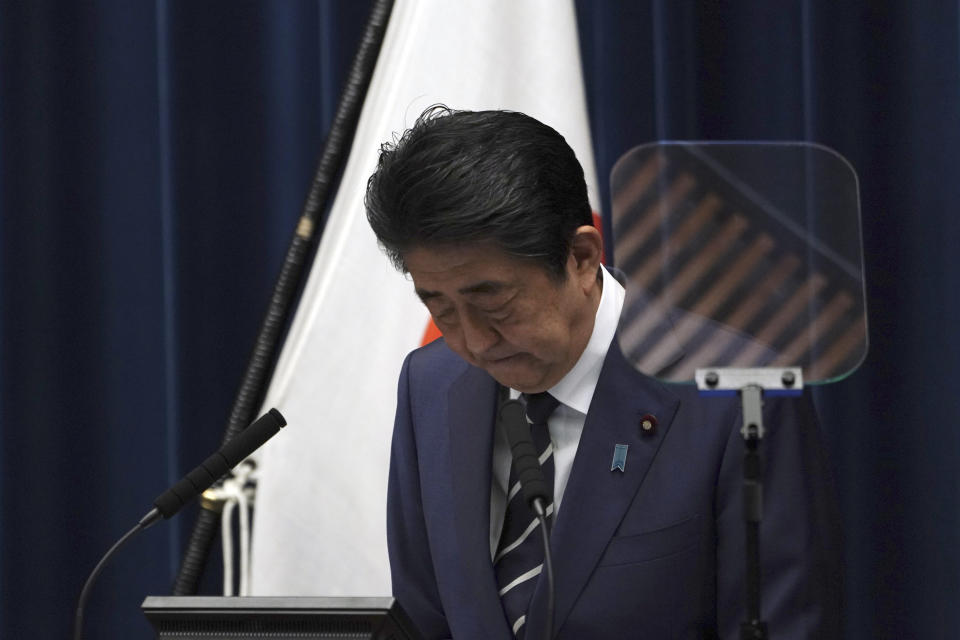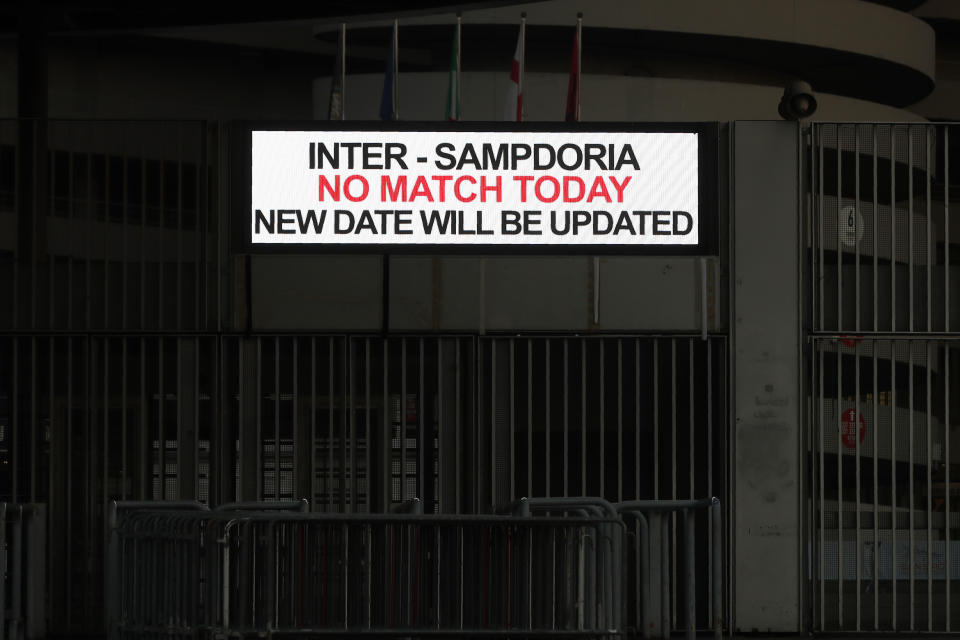All the ways coronavirus is hitting the sports world
The spread of coronavirus is wreaking havoc on a broad swath of the global economy, as major companies like Alibaba, Apple, Boeing, McDonalds, and Walmart have all issued warnings about the hit their earnings will take.
And now concerns about the spread of the virus are sending shockwaves across the sports world as well, though it is admittedly an impact area that takes a back seat to loss of life. Still, a huge number of businesses and individuals in sports will be affected.
Sports apparel and sneaker giants issue warnings
Sports apparel companies were the first in the sports world to sound the alarm, which makes sense considering how much of their goods they source from China. On Feb. 4, Nike warned that the coronavirus would have a “material impact” on its business in China.
To say that China is a big part of Nike’s (NKE) global strategy is an understatement. Former CEO Mark Parker said in 2019 that “Nike is a brand of China, for China,” and the sales numbers back it up: Nike sources 25% of its apparel from China, and around 18% of Nike’s quarterly revenue comes from China. In Q2 Nike’s business in Greater China grew by 23%.
New Nike CEO John Donahoe, who took the reins in January, begins his role at a pivotal moment, under considerable pressure. When it comes to coronavirus, “In the short term, we expect the situation to have a material impact on our operations in Greater China,” Donahoe said in February. “However, Nike’s brand and business momentum with the Chinese consumer remains strong, as reflected in the continued strength of our Nike digital commerce business.”

In response to coronavirus, Nike temporarily shut down approximately half of its brand-owned stores in China, and the stores that were not closed in the region ran on reduced hours. On March 2 Nike decided to close its European headquarters located in the Netherlands for two days after an employee was infected with the coronavirus, according to ANP, a Dutch news agency. Last month HSBC downgraded Nike from Buy to Hold due to the potential impact of the coronavirus.
Under Armour came next. On Feb. 11, Under Armour warned that coronavirus would cause a $50 million to $60 million hit to its revenue in Q1. China has been a silver lining amid Under Armour’s (UA) losing streak in the past two years, with sales there growing as North America sales decline. The stock, which had rebounded considerably in 2019, took a hit after starting off 2020 (and new CEO Patrik Frisk’s tenure) with an earnings miss, and the brand’s problems go way beyond coronavirus. Frisk put the situation plainly: “I’m not satisfied with where we are today.”
Later in February, Adidas (ADDYY) and Puma (PUMSY) both raised coronavirus red flags.
Adidas acknowledged that its business activity in China was down 85% since the Chinese New Year on Jan. 25, a staggering decline.
Puma, headquartered just across the Aurach River from Adidas in Herzogenaurach, Germany, is feeling the coronavirus hit as well. The brand, which has been experiencing a renaissance of sorts in America, warned that it expects to see an impact from the virus on sales and profits in Q1, though the brand is still aiming to hit its original 2020 targets.
By Feb. 20, Puma was feeling “more optimistic about the situation,” a Puma spokesperson said in a statement to Yahoo Finance. “Most of our factories in China are operational… More than half of our stores are closed, as per local authorities’ request. We have seen an increase of e-commerce demand in China, but because of logistics restrictions, it is difficult to fulfill the orders.”

Before the coronavirus came along, some of the sports brand stocks had been high-fliers for quite a while. A recent HSBC note on the state of the sporting goods sector found that the investment banks see stretched valuations, mainland China profit risk, and foreign exchange headwinds as limiting the upside to these names.
Now, due to coronavirus, these companies face headwinds on two fonts – the supply and demand – according to HSBC’s Erwyn Rambourg: “A significant portion of sales and profits come from mainland China and Asia, and there is a risk that part of the supply chain could be disrupted due to the challenges in mainland China right now.” In other words: Coronavirus is keeping Chinese shoppers inside and keeping goods from being shipped out of China.
Rambourg still sees strength for Nike, Adidas, and Puma in the long run since they’re youth-driven. Cowen analyst John Kernan echoed the sentiment in a recent note on Adidas: “Coronavirus will eventually fade—and valuation contraction to 21x our lowered FY21 EPS estimate creates opportunity, given the durability of the brand and its position in sport/culture/streetwear.”
And there’s one more factor that helped these sports names prepare, unintentionally, for the coronavirus storm: tariffs.
Nike, Adidas, and others already began to shift their sneaker supply chains away from China amid the trade war last year. Mitch Modell, CEO of the sporting goods chain Modell’s, tells Yahoo Finance, “Footwear is probably the least amount of hit we’re going to have regarding China. Everyone, with all the tariffs, moved it out of China. It’s more of an apparel and sporting goods issue.”
Nike’s North American apparel is produced in Latin America, while apparel for the European market is produced in Egypt, and apparel for Northern Asia is made in Southeast Asia.
But all of these companies still make a significant amount of goods in China. And Rick Helfenbein, former president of the American Apparel & Footwear Association, tells Yahoo Finance that the problems in China affect products manufactured elsewhere, such as Vietnam.
“The problem is that many of the factories in Vietnam have managers that are from China, and right now, they can’t get out of the country,” says Helfenbein, who compares it to a football team trying to play a game without its head coach.

Concerns about the Tokyo Olympics this summer
The spread of the virus in Japan has prompted concerns and rumors that the International Olympic Committee could make a decision to cancel the Games as early as May, but the committee’s official stance remains positive on the outlook for Tokyo 2020.
“Countermeasures against infectious diseases constitute an important part of Tokyo 2020’s plans to host a safe and secure Games,” the committee said in a statement to Yahoo Finance. “Tokyo 2020 will continue to collaborate with all relevant organisations which carefully monitor any incidence of infectious diseases and will review any countermeasures that may be necessary with all relevant organisations. In addition, the IOC is in contact with the World Health Organization, as well as its own medical experts.”
IOC member Dick Pound raised alarms last week when he said that if the outbreak does not improve by May, outright cancelation is the only likely option.
That prompted some American sports fans who had already booked trips for the Olympics to call travel firms asking about their cancelation policies.
Japanese officials recently said that the contract for the Olympics requires it to be held in 2020, so it could delay for a few months into late 2020.
Japanese Prime Minister Shinzo Abe recently said the country needs to fight the outbreak to ensure the Olympics continue as planned.

Live sports feel the pain, especially European soccer
At least the Summer Olympics aren’t set to begin until July, and the IOC has until May to make a decision. In the nearer-term, and on a smaller scale, coronavirus is already wreaking havoc on European soccer.
In Italy, which has been hit hard by coronavirus, four Serie A matches were postponed last Sunday: Inter Milan vs Sampdoria, Torino vs Parma, Verona vs Cagliari, and Atalanta vs Sassuolo. On Thursday, Inter Milan and Ludogorets played in a closed stadium with no fans, and over this past weekend Inter Milan and Juventus did the same in Turin.
A number of towns in the Lombardy and Veneto regions of Italy are on lockdown with schools closed, just as in Japan schools have been closed until late March—so youth sports are feeling it as well.
In the NBA, which was already dealing with a political scandal in China since October, teams and players have been advised not to travel to China amid the coronavirus outbreak. And after players like CJ McCollum of the Portland Trailblazers tweeted out that he is “taking a break” from signing autographs for the time being, the NBA sent a memo to all players advising them to use fist-bumps to greet fans instead of high-fives, and to avoiding signing autographs.
The Chinese Basketball Association (CBA) suspended all of its games indefinitely on Feb. 1, which left American players in that league in limbo, as they weren’t earning game checks but could not sign elsewhere. (One such player, Chasson Randle, reached a settlement with his CBA team that allowed him to leave China and sign with the Golden State Warriors.)
And the NCAA is getting pressured to consider holding some games in its upcoming March Madness basketball tournament in closed arenas with no fans. Ramogi Huma, the executive director of the National College Players Association, is calling for a “serious discussion about holding competitions without an audience present.”
Clearly, “serious discussions” are happening all across the sports world as the virus spreads.
—
Anjalee Khemlani is a senior reporter at Yahoo Finance who focuses on healthcare. Follow her on Twitter @AnjKhem.
Daniel Roberts is an editor-at-large at Yahoo Finance who focuses on sports business. Follow him on Twitter at @readDanwrite.
Reggie Wade is a writer at Yahoo Finance who focuses on the sneaker business. Follow him on Twitter at @ReggieWade.
Read more from Yahoo Finance about coronavirus and sports:
Coronavirus is stoking fears of Tokyo Olympics customer cancellations
Coronavirus update: Nerves surround Tokyo Olympics
Nike warns coronavirus will have ‘material impact’ on its China business
HSBC downgrades Nike on coronavirus fears
Under Armour warns of coronavirus impact in China, analyst says it has ‘peaked’ in America

 Yahoo Finance
Yahoo Finance 